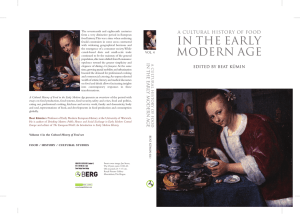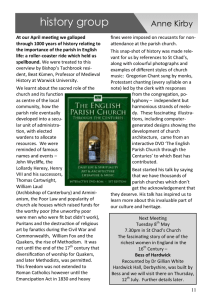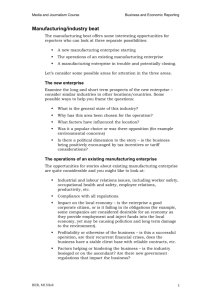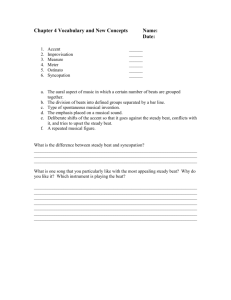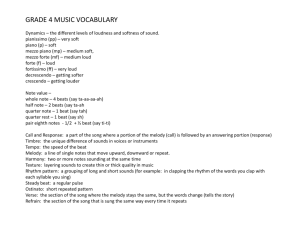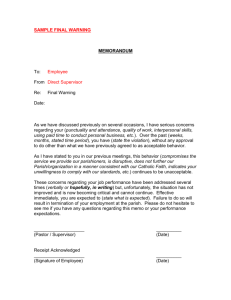Jenny Bevan meet...a professor of history
advertisement
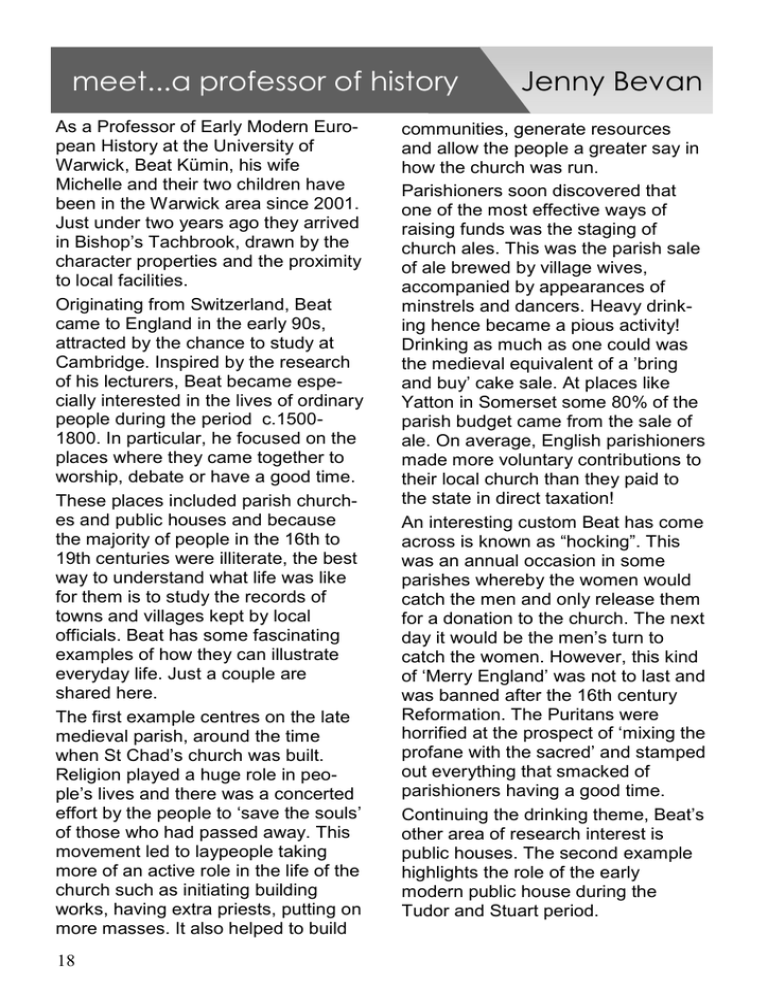
meet...a professor of history As a Professor of Early Modern European History at the University of Warwick, Beat Kümin, his wife Michelle and their two children have been in the Warwick area since 2001. Just under two years ago they arrived in Bishop‟s Tachbrook, drawn by the character properties and the proximity to local facilities. Originating from Switzerland, Beat came to England in the early 90s, attracted by the chance to study at Cambridge. Inspired by the research of his lecturers, Beat became especially interested in the lives of ordinary people during the period c.15001800. In particular, he focused on the places where they came together to worship, debate or have a good time. These places included parish churches and public houses and because the majority of people in the 16th to 19th centuries were illiterate, the best way to understand what life was like for them is to study the records of towns and villages kept by local officials. Beat has some fascinating examples of how they can illustrate everyday life. Just a couple are shared here. The first example centres on the late medieval parish, around the time when St Chad‟s church was built. Religion played a huge role in people‟s lives and there was a concerted effort by the people to „save the souls‟ of those who had passed away. This movement led to laypeople taking more of an active role in the life of the church such as initiating building works, having extra priests, putting on more masses. It also helped to build 18 Jenny Bevan communities, generate resources and allow the people a greater say in how the church was run. Parishioners soon discovered that one of the most effective ways of raising funds was the staging of church ales. This was the parish sale of ale brewed by village wives, accompanied by appearances of minstrels and dancers. Heavy drinking hence became a pious activity! Drinking as much as one could was the medieval equivalent of a ‟bring and buy‟ cake sale. At places like Yatton in Somerset some 80% of the parish budget came from the sale of ale. On average, English parishioners made more voluntary contributions to their local church than they paid to the state in direct taxation! An interesting custom Beat has come across is known as “hocking”. This was an annual occasion in some parishes whereby the women would catch the men and only release them for a donation to the church. The next day it would be the men‟s turn to catch the women. However, this kind of „Merry England‟ was not to last and was banned after the 16th century Reformation. The Puritans were horrified at the prospect of „mixing the profane with the sacred‟ and stamped out everything that smacked of parishioners having a good time. Continuing the drinking theme, Beat‟s other area of research interest is public houses. The second example highlights the role of the early modern public house during the Tudor and Stuart period. Beat tells me every decent village needed an inn for food and drink, but also entertainment, dissemination of news, stagecoach posts and political assemblies. One Warwickshire public house involved in an outright rebellion was the Red Lion in Dunchurch (now a private house near the church). Some local gentry families got involved in the famous gunpowder plot of 1605 where Guy Fawkes and his associates attempted to blow up Parliament in the hope of bringing a Catholic monarch to the throne. Leader Robert Catesby stopped at the inn on the night of 5th November to meet with his associates, hoping to start a rising in the Midlands, but – sadly for them – the plan was foiled and the ringleaders killed. As we have seen, tensions between church and tavern increased after the Reformation. In England and on the continent, Protestant ministers fought a massive campaign against drunkenness and immoral behaviour. Ironically, though, in areas with lots of vineyards (like Switzerland), a large part of the clergy‟s income came in the form of wine. So we have the curious situation that the same people who preached against the devil of drink on Sundays, sold masses of alcohol themselves during the week to boost their own income! As anyone who has heard of Buckfast wine (originally made by the monks of Buckfast Abbey), will attest, religious folk continued to make their own alcohol long into the 20th century! To relax when not researching the drinking habits of medieval folk, Beat and his family enjoy travelling all around Europe (and most recently to Israel). As might be expected from someone originally from Switzerland, Beat loves skiing and his family share his passion too. Closer to home, the Kümin family likes to make use of the cycle way and visit local attractions. They also enjoy living close to the local park and being at the heart of the village centre. Beat has suggested that those who are interested in parish history might want to take a look at http://go.warwick.ac.uk/parishnetwork The Christian Family Marriage Richard Lewis and Ruth Philips We offer our congratulations and best wishes for the future. Funeral William Ingram We pray for his soul and offer our sympathy to his family and friends. 19
